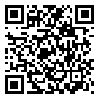Volume 9, Issue 2 (summer 2022)
DSME 2022, 9(2): 3-10 |
Back to browse issues page
PhD, Mother and Child Welfare Research Center, Hormozgan University of Medical Sciences, Bandar Abbas, Iran.
Abstract: (1050 Views)
Introduction: The present study was conducted with the aim of determining the relationship between the components of clinical pharmacology curriculum and clinical skills of nursing students.
Methods: The statistical population of this descriptive cross-sectional study includes nursing students of the Bandar Abbas School of Midwifery Nursing. Samples were collected by census. The data based on the student's opinion regarding the relationship between curriculum components and practical skills, was collected using a researcher-made questionnaire and analyzed based on the results of Pearson's correlation test in SPSS software.
Results: The results showed that the percentage of students who ranked the role of curriculum components including goals, environment and educational facilities, teaching method, evaluation method, educational content with the expected skills of the clinical stage as medium , were 39.3, 37.1, 47.4, and 33.2, respectively. The correlation of curriculum components with clinical pharmacology skill was lower than other clinical skills."
Conclusion: In order to improve knowledge and acquire the necessary skills, the elements of the clinical pharmacology curriculum should be reviewed in all aspects, so that the necessary qualifications will be acquired by nursing graduates in this field.
Methods: The statistical population of this descriptive cross-sectional study includes nursing students of the Bandar Abbas School of Midwifery Nursing. Samples were collected by census. The data based on the student's opinion regarding the relationship between curriculum components and practical skills, was collected using a researcher-made questionnaire and analyzed based on the results of Pearson's correlation test in SPSS software.
Results: The results showed that the percentage of students who ranked the role of curriculum components including goals, environment and educational facilities, teaching method, evaluation method, educational content with the expected skills of the clinical stage as medium , were 39.3, 37.1, 47.4, and 33.2, respectively. The correlation of curriculum components with clinical pharmacology skill was lower than other clinical skills."
Conclusion: In order to improve knowledge and acquire the necessary skills, the elements of the clinical pharmacology curriculum should be reviewed in all aspects, so that the necessary qualifications will be acquired by nursing graduates in this field.
Type of Study: Orginal |
Subject:
Special
Received: 2022/05/8 | Accepted: 2022/09/21 | Published: 2022/12/31
Received: 2022/05/8 | Accepted: 2022/09/21 | Published: 2022/12/31
| Rights and permissions | |
 |
This work is licensed under a Creative Commons Attribution-NonCommercial 4.0 International License. |



